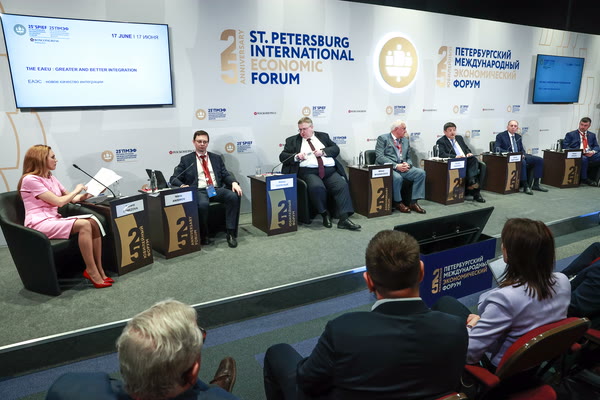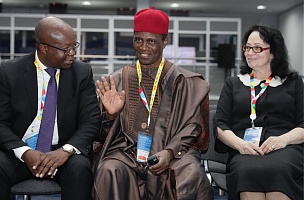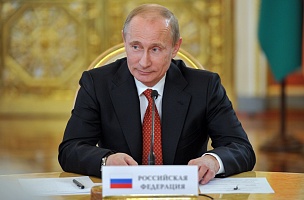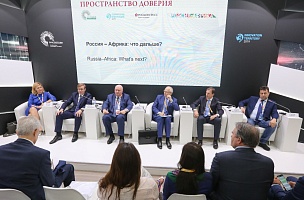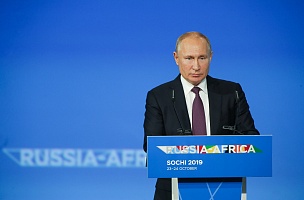Key conclusions
The Eurasian Economic Union has proven its robustness. However, in order to increase its potential, the boundaries of cooperation need to be expanded
“Our intergovernmental organization has proven to be robust and capable of overcoming crises. <...> Overall, our union was marked by economic growth in 2021,” Akylbek Zhaparov, Chairman of the Cabinet of Ministers of the Kyrgyz Republic – Head of the Presidential Administration of the Kyrgyz Republic.
“In my opinion, this is not the first time we have found ourselves in a difficult economic situation. <...> Joint development through integration is what I think represents the natural and correct path,” Dmitry Volvach, Deputy Minister of Economic Development of the Russian Federation.
“If, looking ahead, we are expecting that the Eurasian Economic Union must act to a certain extent as a central hub for integration in relation to the Greater Eurasian Partnership, then we absolutely need to expand the scope of the Eurasian Economic Union treaty,” Mikhail Myasnikovich, Chairman of the Board, Eurasian Economic Commission.
In order for integration to develop along a positive path, there needs to be cooperation across a wide range of areas
“Eurasian integration is today at a stage where it is transitioning from removing barriers to pursuing positive integration, deepening integration processes, and increasing the added value offered by supranational cooperation. Of course, the quality of this integration is determined by the quality of the EAEU’s human capital,” Nikita Anisimov, Rector, National Research University Higher School of Economics.
“The EAEU is on a very good footing. However, from our point of view, we do of course need to add a cultural and humanitarian component. If we don’t do this, more and more will be lost in translation between our peoples, so to speak. There will be more and more competing views, and ultimately, integration could indeed suffer,” Alexey Overchuk, Deputy Prime Minister of the Russian Federation.
PROBLEMS
Cooperation and engagement by development institutions are not at the level required to boost the EAEU’s economic standing
“We must aim towards the establishment of new enterprises, new production facilities. And development institutions undoubtedly need to play a more active role in this regard. <...> We must create an environment where joint ventures and integration initiatives are of benefit to businesses,” Mikhail Myasnikovich, Chairman of the Board, Eurasian Economic Commission.
“We need to work on the creation of fully-fledged development institutions which are capable of identifying new priorities and prospects for developing our union. They also need to be able to draw up effective programmes and projects,” Akylbek Zhaparov, Chairman of the Cabinet of Ministers of the Kyrgyz Republic – Head of the Presidential Administration of the Kyrgyz Republic.
“Connectivity is of course about building cooperation and joint investment projects. We speak about this a great deal, but in order to achieve this, we need first of all to build a new financial and economic space,” Sergey Glazyev, Member of the Board, Minister in Charge of Integration and Macroeconomics, Eurasian Economic Commission.
Relations between states need to be further streamlined under the EAEU
“There is a project entitled Digital Technical Regulation which is of particular importance in the EAEU. We think that this platform specifically will help streamline relations between states in terms of accreditation, assessing conformity, government control, and oversight. This will also provide businesses with additional opportunities to respond quickly to the latest product requirements,” Dmitry Pumpyansky, Vice President, Member of the Management Board, Russian Union of Industrialists and Entrepreneurs.
“In addition to external factors which have had an adverse effect on our union’s economy, there are also internal factors, such as the existence of barriers and obstacles to the union’s internal market. There is a pressing need to restructure existing mechanisms for combatting these issues,” Akylbek Zhaparov, Chairman of the Cabinet of Ministers of the Kyrgyz Republic – Head of the Presidential Administration of the Kyrgyz Republic.
“We essentially need to develop a new chain for the division of labour. In it, a predominant position – currently empty, essentially – should be given to how we are going to train people for managerial roles... These people need to be comfortable not only working in the union as it is today, but also in terms of how this union will cooperate with Iran, China, India, and Egypt,” Robert Urazov, General Director, Professional Skills Development Agency (WorldSkills Russia).
SOLUTIONS
Products made in the EAEU should be made more competitive, and efforts should be made to boost exports
“The interest is there, the products to trade are there; however, we are also seeing that the possibilities are limited to a certain extent. So, we need new competitive goods and new production facilities – especially now, when in light of sanctions we need to address issues related to the domestic market, and work on exports,” Mikhail Myasnikovich, Chairman of the Board, Eurasian Economic Commission.
“We need to implement genuine joint ventures – not only in industrial sectors involving the establishment of joint enterprises, but in terms of introducing tools and mechanisms for supporting exports from our union,” Akylbek Zhaparov, Chairman of the Cabinet of Ministers of the Kyrgyz Republic – Head of the Presidential Administration of the Kyrgyz Republic.
Increasing humanitarian cooperation will enable countries to strengthen their standing both domestically and in the international arena
“It is worrying that we occasionally see discussions take place regarding why we (in some countries – we know where this is happening more, and where it’s happening less) need the EAEU. These discussions will happen if we do not pay heed to aspects related to culture, education, and history. Once you delve into history, it becomes clear that our Eurasian space has always existed as a single whole,” Alexey Overchuk, Deputy Prime Minister of the Russian Federation.
“We need to train a fairly large number of people in a short space of time who are not just adept at Eurasian matters, but who are positively bristling with knowledge. This could be done through partnerships between universities, and through further education programmes – these are the faster options,” Nikita Anisimov, Rector, National Research University Higher School of Economics.
“In fact, the creation of a common space for science and technology is a priority, and probably the most important one for the long term. In this regard we are working on an integrated computer network encompassing universities and scientific organizations. We also need support from the government, experts, and scientific communities. A common labour market is taking shape, and along with the Work without Borders programme (which employs digital technology), the creation of common standards is very important,” Sergey Glazyev, Member of the Board, Minister in Charge of Integration and Macroeconomics, Eurasian Economic Commission.
“It seems to me that the alliance that we are talking about today needs to be supplemented not only with people who can work with their hands (i.e. make things)... but people who can organize the production process – entrepreneurs and managers. Without looking at this as an interconnected whole, it won’t be possible to make progress,” Robert Urazov, General Director, Professional Skills Development Agency (WorldSkills Russia).
Improvements to transport logistics will help forge strong ties within the EAEU
“In order to build ties, and forge genuine partnerships... we will need new transport projects. And there may be a need to reject well-established strategic perspectives on transport projects, because for a long time the focus was on primarily developing transport projects for the purposes of transit,” Ivan Safranchuk, Director, Centre of Euro-Asian Studies, Institute for International Studies, MGIMO University.
“The shifting focus of commodity flows from West to East is very noticeable. This is a very big signal, in all likelihood, for our former partners, because all these flows are still moving along a particular infrastructure, which is also being built and developed. And the new ties being forged will be very strong indeed,” Alexey Overchuk, Deputy Prime Minister of the Russian Federation.
For more information, visit the Roscongress Foundation’s Information and Analytical System at roscongress.org/en


